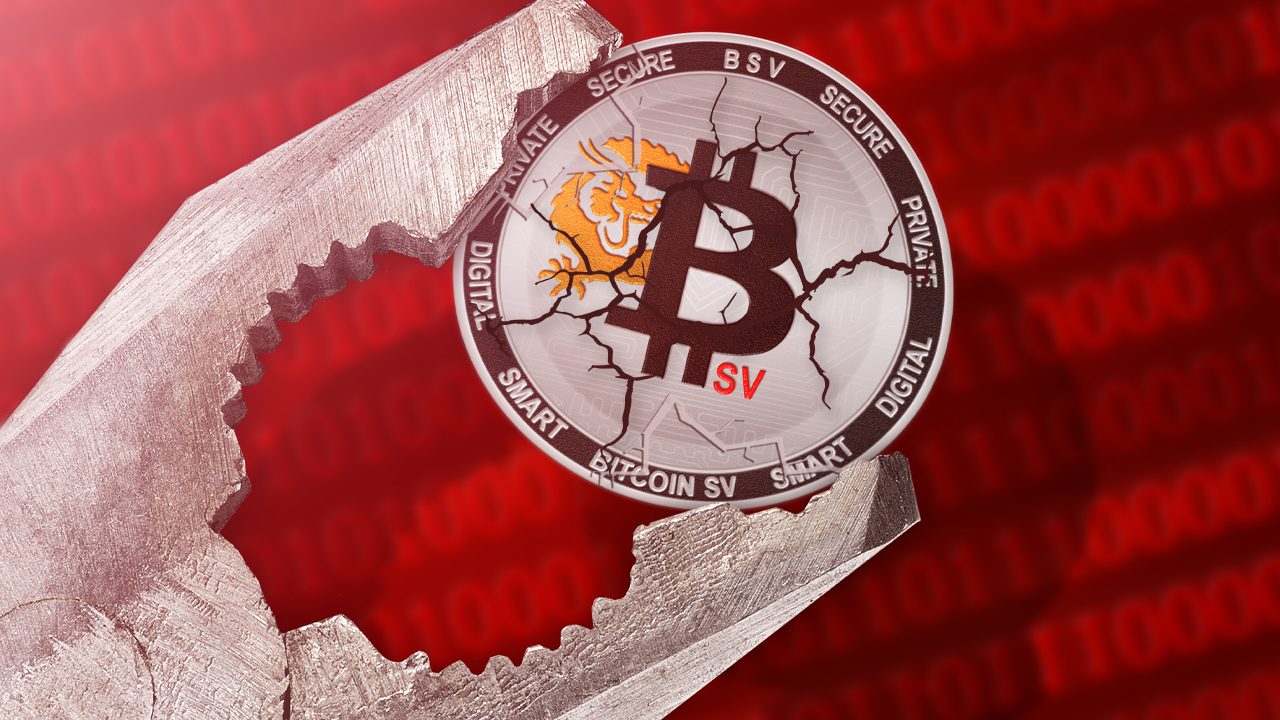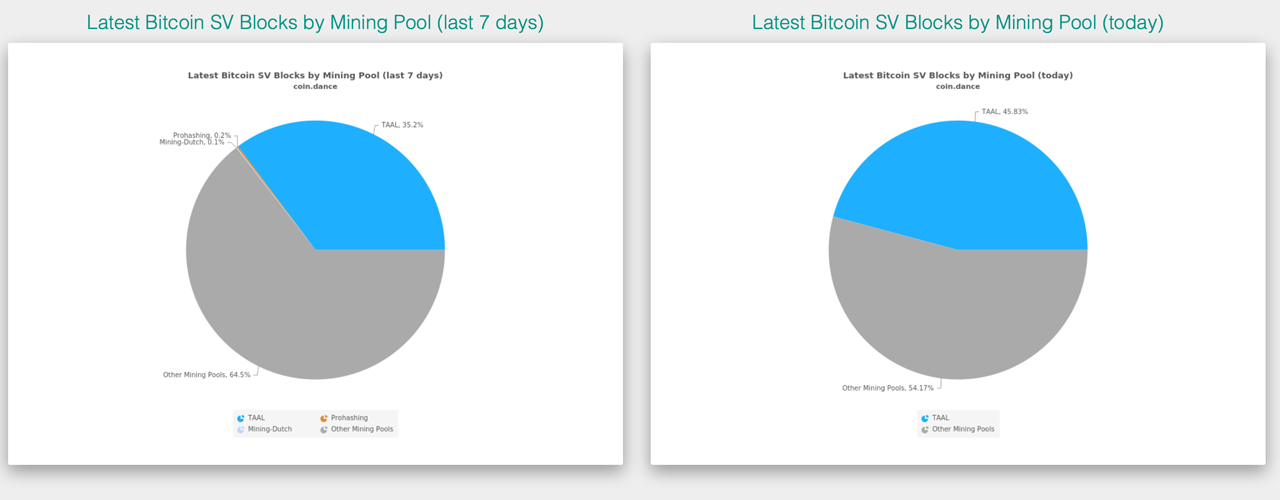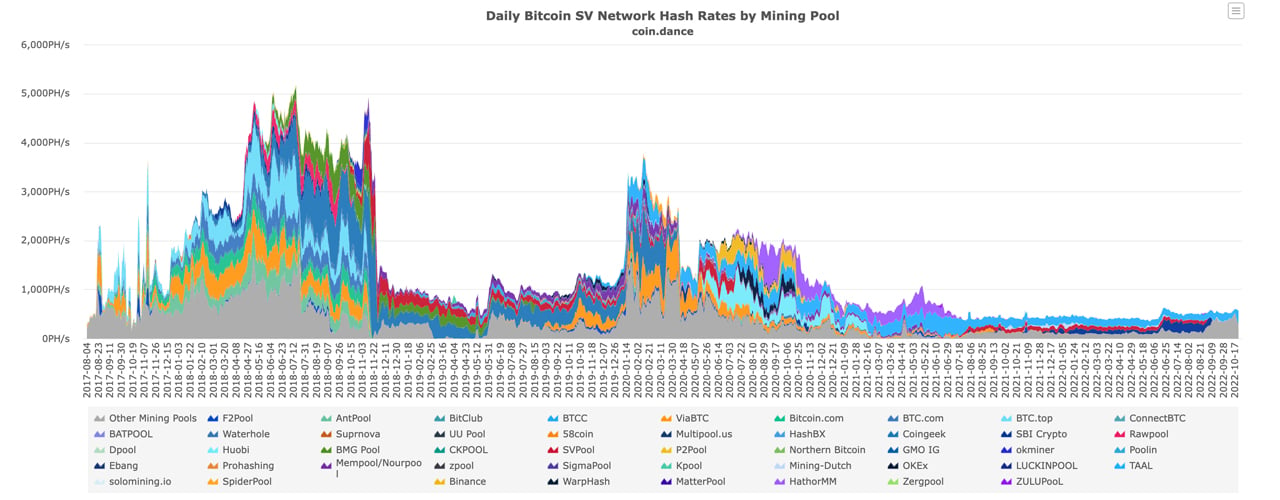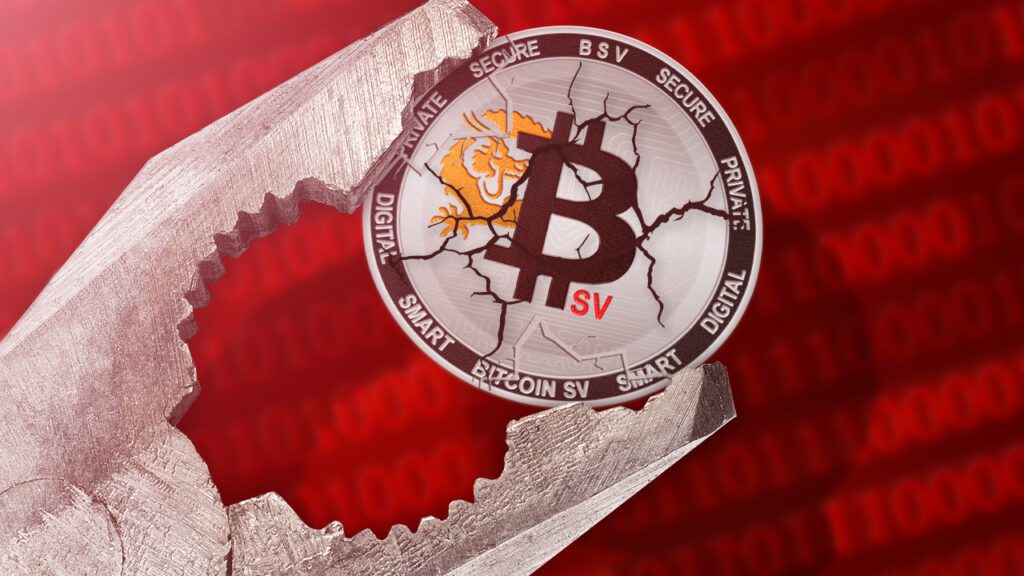
A single miner has managed to overtake a large portion of the Bitcoinsv (Bitcoin Satoshi’s Vision) blockchain capturing more than 80% of the hashrate on October 17. Today, the unknown miner’s hashpower commands around 54% of the Bitcoinsv’s computational power and during the last seven days, the stealth miner captured 64.5%.
Unknown Hashpower Captured 64% of the Bitcoinsv Chain During the Past 7 Days, Empty BSV Blocks Renders Chain Useless at Times
Bitcoinsv (BSV) has been dealing with an unknown miner trolling the project by mining empty blocks, and capturing a great majority of hashpower. Statistics from Coin Dance indicate that the miner captured 80% of the hashrate between October 17 and 18, 2022.
Interestingly, the unknown miner took over the blockchain’s hashrate during the defamation trial between Craig Wright, the man who claims to be Satoshi Nakamoto, and the pseudonymous Bitcoiner Hodlonaut. Wright lost the lawsuit and Hodlonaut was acquitted of all claims related to the defamation case.
The self-proclaimed Satoshi, otherwise known as Craig Wright, was also ordered to pay $348,257 to compensate Hodlonaut’s court expenses. While the court case was not yet decided, the unknown miner ramped up its hashrate efforts a few days before the lawsuit ended.

Instead of mining blocks with tens of thousands of transactions, the miner chose to mine near-empty blocks making the blockchain unusable for long periods of time. The BSV miner leverages the BSV address “1KPST” and to date the miner has managed to mine 31,111 BSV.
While writing this article, at 8:30 a.m. (ET), the unknown BSV miner captured the last six blocks and each block subsidy has only one transaction (Block 762,740 to Block 762,745). The recent attack against BSV is not the blockchain’s first rodeo with a malicious miner trolling the project.

Bitcoinsv Was Attacked Last Year and Suffered a 100-Block Reorganization
In mid-July 2021, crypto exchanges halted BSV deposits after 78% of the BSV hashrate was captured that month. During the first week of August 2021, the network was brought to its knees when a miner 51% attacked the Bitcoinsv chain. On Tuesday, August 3, 2021, the BSV network endured a 100 block reorg “wiping out 570K transactions,” according to the founder of Blockchair, Nikita Zhavoronkov.
On October 17, 2022, when the unknown miner captured around 80% of the network, the organization behind the BSV project called the Bitcoin Association, said that it planned to take action against the stealth miner.
“Bitcoin Association is taking action to contact all relevant exchanges and miners to freeze all block rewards associated with this malicious miner and will be pursuing criminal charges against the entity/entities responsible,” the Bitcoin Association wrote.
The Bitcoin Association’s (BA) message further notes that it has been tracking the miner for months, and the increased presence has caused “network problems for honest miners and businesses that interact” with the Bitcoinsv network.
In the same blog post update, BA insists that “producing an empty block is not inherently a dishonest act per the rules set forth in the whitepaper.” The same day, BA also tweeted out an article hosted on bitcoinsv.com that claims “mining empty blocks hurts the Bitcoin network.”
On October 23, the native crypto asset bitcoinsv (BSV) is down 3% in value against the U.S. dollar and 1.8% against bitcoin (BTC). Year-to-date, the token BSV has lost 72.7% against the greenback and BSV is 90.5% down from the all-time high recorded on April 16, 2021.
During the last 24 hours, BSV has seen $25.19 million in global trade volume and a great deal of trades stem from South Korea. The Korean won today represents 46.68% of BSV’s global trading pairs according to cryptocompare.com data. Tether (USDT) is BSV’s second-largest trading pair with 35.69% of all BSV trades, followed by usd coin (USDC) with 8.45% of BSV swaps.
What do you think about the unknown miner on the BSV chain mining a massive amount of empty block subsidies? Let us know your thoughts about this subject in the comments section below.
Image Credits: Shutterstock, Pixabay, Wiki Commons
Disclaimer: This article is for informational purposes only. It is not a direct offer or solicitation of an offer to buy or sell, or a recommendation or endorsement of any products, services, or companies. Bitcoin.com does not provide investment, tax, legal, or accounting advice. Neither the company nor the author is responsible, directly or indirectly, for any damage or loss caused or alleged to be caused by or in connection with the use of or reliance on any content, goods or services mentioned in this article.
Read disclaimer


